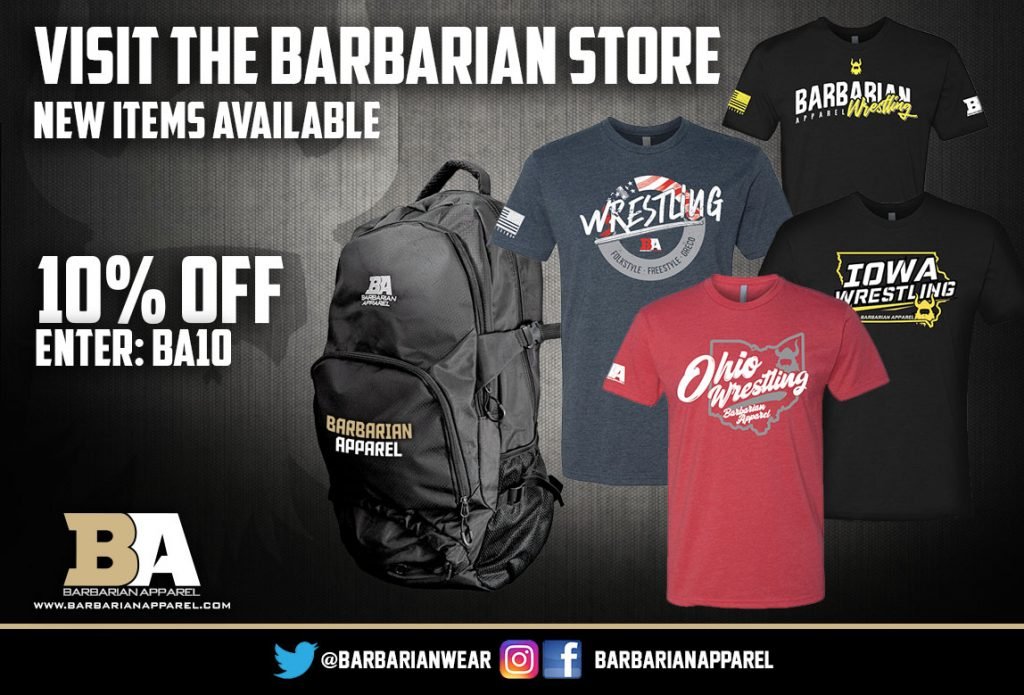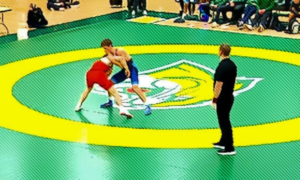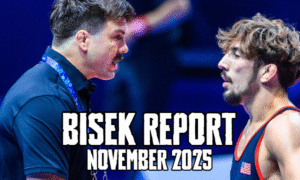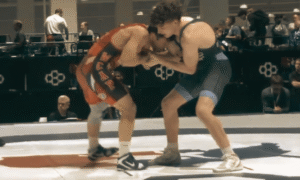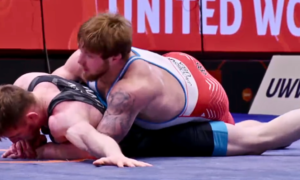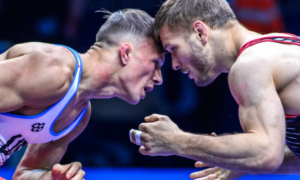I recently took a trip to Harris County, Georgia to help a couple of former teammates and friends of mine with a wrestling clinic that they run every year. I have known Joey DeNova for almost ten years now. He is one of the kindest, most caring and passionate guys in the sport of wrestling. He is also a technical machine who has a wealth of knowledge. What I didn’t know was how wrestling was perceived in Harris County, which is where Joey went to high school. It was eye-opening and made me take a trip in my mind back to the place where I myself grew up in, and how these two places are different in many ways when it comes to wrestling — but both still produce very good wrestlers.
Throughout the camp I came up with an idea to tell Joey’s story and how passion and perseverance launched him towards a successful wrestling career. But before that, I want to provide a background of where I grew up and how wrestling plays a role in my hometown. This will explain why I wanted to tell DeNova’s story.
I grew up in Minnesota in a town called St. Michael. For people who might not know, STMA (short for St. Michael-Albertville) has been a wrestling powerhouse in the state of Minnesota for over three decades and they have been relevant in terms of team success dating back to the early 1970’s.
The STMA wrestling program is a well-oiled machine. It is an eight-time state championship-winning program that feeds off of a successful youth program which itself has hundreds of kids come through each year, accompanied by a terrifically-coached and successful middle school program that, naturally, leads into the high school program. And the high school team includes past division I, II, and III college wrestlers as coaches. In addition, there is the off-season youth and high school program run by STMA called Hi-Flyers, which is coached by current student-athletes from the University of Minnesota.
When people walk into the STMA wrestling room, most of them stop and stare in awe at all the awards adorning the walls in that room. Hundreds of individual state place winners, a long list of state champions, three decades worth of state-placing dual teams, eight dual state championships, NCAA All-Americans and Olympians. It really is something else. From the moment you join the STMA program, you know what the goal is: state titles. The support from the community is amazing, as well, and the fans are the best in the state. The facilities are also some of the best in the country.
Minnesota, a state long associated with wrestling, has a laundry list of resources if you are interested in improving. From free off-season practices at Augsburg college and Gopher wrestlers running club practices… to former state champs and collegiate athletes opening up wrestling schools, highlighted of course by one of the top powerhouse clubs in the nation, PINnacle.
But looking back, I am actually a little disappointed in myself about how naïve I was growing up in St. Michael. Being a part of a program that expects success at all levels, it is easy to think that’s what every school and program demands. Now as a coach myself and watching how other schools around the country operate, it has really opened my eyes to other wrestling cultures and how their programs tackle development.
Which is where the story begins with Joey DeNova.
I met Joey while we were both student athletes at Northern Michigan University’s Olympic Training Site for Greco-Roman. We were suitemates for many years and our relationship grew into a lasting bond. At this point, I consider us set to become lifelong friends. For five years, Joey and I did most everything together. We trained together, ate our meals together, went to class together, and traveled across the world together. And if we couldn’t head home and spend holidays or birthdays with our families, we did that together, too. Eventually, we were in each other’s weddings, and now we are running clinics.
Together.
Joey is so passionate about wrestling, he doesn’t expect anything in return for giving back to the sport that gave him so much. He is technically sound, mentally-tough, and knows full-well what hard work is and what it takes to be a successful wrestler. Except — he had to learn with minimal resources, which is quite the opposite of what I had. Such is why I think it’s only right to tell the stories of athletes who had to learn this grueling sport on their own and do it their own way in order to find success.
Joey DeNova — Coach/Co-Founder, DeNova Brothers Camp
5PM: For the sake of the audience, where are you from?
Joey DeNova: I am from Harris County, Georgia and I started wrestling when I was five-years-old.
5PM: How prevalent was wrestling in that area and in your high school? How was it looked at or treated in reference to other sports like football or something like that?
JDN: Harris County is right above Columbus, but it’s a rural area. Harris County was known for football and Columbus High School was known for their baseball. Both Harris County and Columbus High have a history of high-level athletics and had multiple players go professional. So as you can imagine, wrestling was kind of a side note to all the sports in the area. Wrestling in general just isn’t as big of a deal here in the South as it is in say, the Midwest states. We would start the season with 15-20 guys, then by the time the end of the season came around we would only have five to six guys in the practice room. It definitely wasn’t a mainstream sport by any means.
5PM: Since you grew up in a town like that where there wasn’t a ton of support or resources for the sport of wrestling, what was it that made you stick it out even though you didn’t have the resources such as a Midwest state?
JDN: I actually grew up in Washington State for 12 years. My dad was an Army Ranger and was stationed at Fort Lewis in Washington. The culture of wrestling in Washington was awesome, man. From a young age in Washington, we had good support that helped fostered a love for the sport. My dad wrestled growing up, so my brother and I kind of followed in his footsteps. The love, passion, and work ethic was developed early on and that really helped us. When we moved to Georgia, it was definitely a culture shock wrestling-wise because there are not as many places to train. We kind of had to go Rocky style and train on our own strength and conditioning-wise, and drive across the state or to other states to find training partners and coaches to keep getting better.
5PM: That’s pretty sweet that you had that passion early on and even when you moved you still had it. A lot of people would’ve been like, Alright, well, I don’t have the resources to keep getting better in this sport so I am just going to try something else.
JDN: Exactly. It is one of those things where you know, you really do need to have a love and a passion for the sport in order to get to where you want to be. Especially in an environment that doesn’t have as many opportunities to find places to wrestle. It was often challenging at times, but like I said, it was a family affair. My brother and I were in the same boat, so having a teammate who was always there to help push you when times get tough played a big part of the development and drive for both of us.
5PM: Can you talk about Harris County high school and touch on the wrestling culture a bit more?
Joey DeNova: I went to Columbus High School up until halfway through my junior year and then transferred to Harris County. Neither high school had a wrestling room. In Columbus, we had to practice in the cafeteria. Everyday after school, we would have to take down all of the tables and chairs and move them to the side so we could roll out the wrestling mat; then after practice, we rolled the mats up and would have to set the cafeteria back up for school the next day.
At Harris County we practiced in the upper part of the gym. Again, we would have to roll the mats out everyday and get the area ready for practice, and then after practice we had to roll the mats back up and clean the area up. It’s not like we just got to walk into a wrestling room and put our shoes on and get to work. Like I said, wrestling wasn’t very prevalent in the area and training partners were hard to come by. I remember my junior year after practice at Columbus, I would drive to a different high school to workout with one of my buddies so I could get in some more work since he also didn’t have any training partners. There were even days during the season where my buddy’s coach wouldn’t have the wrestling room open and we had to ask for a key, or ask for a janitor to let us in just so that we could practice. I had to take it upon myself most of the time to get better. I’ve always had a deep passion for this sport and I knew that I had to take control of my own destiny if I wanted to be successful. In high school, that meant making opportunities for myself.
5PM: Can you talk about some age group accomplishments and high school accomplishments as well?
JDN: Absolutely. Going back to my middle school days, I was a two-time time Schoolboy National Champion. In high school, I was a four-time state placer, three-time state finalist, and a two-time state champ. I took third my freshman year. As far as national competition went, I was a USAW (USA Wrestling) Folkstyle Junior All-American my junior year and a three-time Fargo All-American in Greco-Roman. I went on to become a FILA Junior Greco National champ, University National Greco runner-up, and a Senior All-American during my time at the United States Olympic Training Site at Northern Michigan University
5PM: Was Greco always a passion or when did you start wrestling Greco?
JDN: My passion for Greco actually started when I lived in Washington State and wrestled for a club out there, the Bethel All-Stars. The All-Stars had a freestyle and Greco program, in addition to a folkstyle program, so we were able to wrestle year-round with the same team. My coaches and my dad had me wrestling Greco from a young age and I fell in love with it. Although my passion for Greco has grown immensely, it didn’t start that way. I remember getting thrown around like a rag doll my first few practices and telling my dad I never wanted to wrestle Greco again! You see how that ended up (laughs).
5PM: When did you decide that Northern Michigan University was the right choice for you to continue your Greco career?
JDN: I actually heard about Northern Michigan University while competing in Fargo. The Greco All-Americans received a packet when they placed and I remember seeing a page about the (formerly known as) The United States Olympic Education Center. I used to always see highlights of Spenser Mango bombing dudes when I was in high school and knew that’s where he trained, so it was always on my mind. I originally wanted to go the folkstyle route in college and had a scholarship to wrestle at Kent State. But after I lost in the finals at state my senior year, I talked with my family and coaches, and decided that NMU was the right choice.
5PM: Since we’re on the topic of NMU, can you touch on your time in Marquette?
Joey DeNova: Yeah man, it was one of the best times of my life. It was also one of the absolute hardest things I have ever done. It’s a mixture of having the time of your life, meeting new friends and teammates and traveling the country/world with them, while also wanting to quit every time your alarm went off at 6:00am for morning practice. It was such an honor to be able to train alongside Olympic and World-level coaches and athletes while also being able to represent your team and country on the international stage.
We had hammers in every weight class at NMU. We had Junior and Senior World Team members, US Open All-Americans, and National Team members going at it every single day. It was a fight every time we stepped on the mat, but I wouldn’t trade it for the world. It was tough for a number of guys, too, because they didn’t fully understand what they were signing up for. Some guys thought, Oh man, I get to train for the Olympics and travel the world. This is awesome! But they would quickly change their tune once they saw what that actually meant. Needless to say, we normally weeded those guys out pretty quickly.
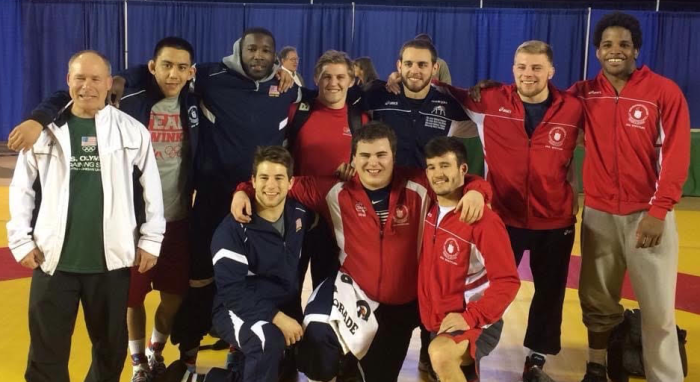
Members of Northern Michigan’s Olympic Training Site Greco-Roman team following a dual meet victory over Navy in 2015. Author Parker Betts can be seen in the bottom row kneeling with his arms around Sammy Jones (left) and DeNova. (Photo provided by Parker Betts)
5PM: I was thinking about that the other day. How many people would start each semester with us then wound up leaving after only one semester. But the guys who stayed and made it through all developed a special kind of bond with each other.
JDN: It’s pretty sweet to think about. Not only are you training twice a day, but you’re also going to college as a full-time student. The pressure of one or the other is a lot, but doing both was a different animal and a lot of guys couldn’t take it. We’d have guys drop out of the program just about every semester I was up there.
5PM: Like most wrestlers, I am guessing you had some difficult losses in your career. How did you respond to those losses and what tools did you use to move on from them?
JDN: A big one that still stings is the loss in the state finals my senior year. It was my last high school match and I took it really hard. But that actually propelled me towards a new path in my wrestling career. I learned a lot of things from that match — such as staying focused on your goals, being in the right state of mind during tournaments, and doing the right things on and off the mat.
I also had to take time to be brutally honest with myself about what I truly wanted to get out of my career. It took me a couple weeks to answer that question, but I remember my answer being a simple one: I want to be the best in the world. I didn’t want to reflect on my career with any regrets when I finally hung my shoes up, and I knew that started with me accepting my mistakes and making sure I didn’t make the same ones again.
5PM: Sometimes wrestlers get interviewed after a loss and they come back and do something great later in the season or in their career and they credit a loss for their comeback or accomplishment. They talk about going to a dark place, and if you’ve never experienced that you don’t really know what that means.
JDN: Man, it’s true when they say wrestling is a direct reflection of life. Things are going to hit you harder than you expect sometimes and it’s up to you to figure it out and kind of navigate through that. It’s tough at times, but you have to learn and adapt.
5PM: You’ve been running the DeNova Brothers camp for six years now with your younger brother Tyler, who was also a teammate of ours at NMU for one year. What was it like to experience the two of you being able to train together, along with how you two now give back to your community and coach together?
Joey DeNova: Yeah man, it was so awesome. We started this journey together over 20 years ago. Wrestling shaped our lives and who we are. It was amazing to be able to train alongside him and travel with him. Injuries sent him home early, but that’s just how the sport works sometimes. I wish we could’ve had more time together up there; but now that we’re back together coaching, I wouldn’t have it any other way.
Wrestling provided us with countless opportunities that we may not have had otherwise, so we always knew we owed the sport when we were finished competing. We knew it was basically our duty to give back to wrestling in one way or another, which is kind of how we developed the DeNova Brothers Camp. We want to give back to our community and help grow and shape the culture of wrestling in Harris County. We want to be role models for these kids and show them that wrestling can take them as far as they can imagine and hopefully teach them about the importance of giving back to the sport.
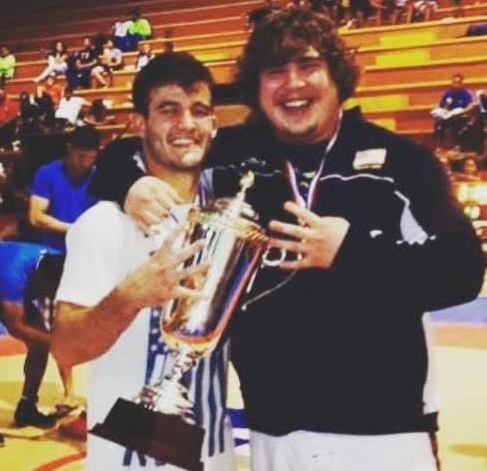
DeNova (left) and Betts in Panama after winning their fourth (and final) team title together as teammates. (Photo provided by Parker Betts)
5PM: It’s not easy to run or coach any program. But it definitely helps when the community is supportive, the school system is supportive, and the resources are there to help grow and build a program. You’re helping a program that hasn’t had that kind of stuff, but it seems like the culture is changing there.
JDN: Absolutely man. You know, the coaches and community have really started to look at the sport differently now. Harris County and the surrounding cities like Columbus have shown major success in the past few years and they’ve got a good group of tough kids who want to get better and succeed. Looking back, I remember having six guys on a dual team heading into dual meets and now they have up to 40 wrestlers every year and are a top-5 team in the state. It’s great to see the direction the program has gone over the years.
5PM: That’s awesome, and there’s no doubt you played a huge role in this turnaround. Where do you see the future of the DeNova Brother’s Camp?
JDN: I hope to be doing this camp every summer for the foreseeable future. My brother and I want to continue to grow this camp and keep bringing in high-level clinicians who are passionate about the sport. We want to continue to bring opportunities to the community and surrounding cities while still being able to be around our first passion, wrestling.
5PM: I just want to thank you for taking the time to talk with me. I know you’re a guy who doesn’t need any acknowledgement for the things you’ve done or are currently doing, but I am making it my job to start telling stories like yours.
Joey DeNova: Thanks for having me today brother! Always a good time talking wrestling with you. Let’s do it again soon.

Listen to “5PM48: Austin Morrow and Gary Mayabb” on Spreaker.
Listen to “5PM47: Nate Engel and Xavier Johnson” on Spreaker.
Listen to “5PM46: Taylor LaMont and Jessy Williams” on Spreaker.
SUBSCRIBE TO THE FIVE POINT MOVE PODCAST
iTunes | Stitcher | Spreaker | Google Play Music



